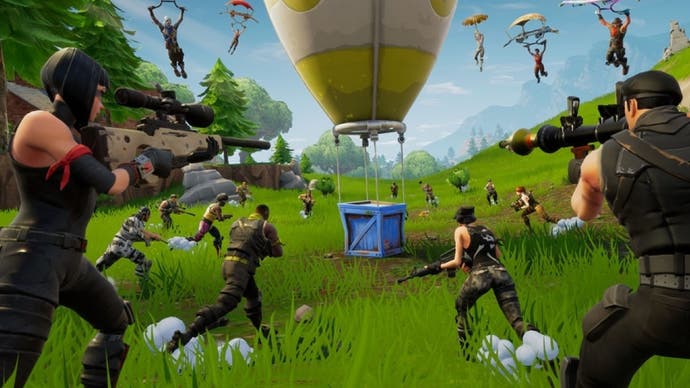Epic under fire as report says Fortnite teams facing "endless" 70-hours-a-week-plus crunch
"The only people that got away with not doing crunch were... the guys... telling people to crunch."
Epic Games has come under fire in a damning new report claiming that its Fortnite teams face regular 70-hours-and-above working weeks in order to meet the phenomenally popular game's gruelling, ongoing update schedule.
Fortnite Battle Royale rapidly found success after its launch in September 2017, and according to a new report by Polygon, Epic's leadership team remains focussed on ensuring Fortnite's popularity holds for as long as possible - even as the game's live service model and demanding patch schedule, intended to sustain momentum, takes its toll on staff.
"If a build went out into the wild and there was a negative reaction," explained one source, "then someone at the top would say, 'We need to change that', and everyone would be pulled in from what they were doing, and people were told to cancel their plans, because they were going to crunch until this was done. It was never-ending. It's great for supporting the community and for the public. But that comes at a cost."
Indeed, according to Polygon's sources - which include full-time staff and contractors working across Epic's development, QA, and customer service teams - as many as 100 employees are working an average of 70 hours a week, with others even reaching the 100-hour week mark.
"Everything has to be done immediately," explained one source, "We're not allowed to spend time on anything. If something breaks - a weapon, say - then we can't just turn it off and fix it with the next patch. It has to be fixed immediately, and all the while, we're still working on next week's patch. It's brutal."
And as Fortnite Battle Royale's popularity has soared, so too have demands on staff. "We went from having a month to prepare," revealed one source, "to sometimes having as little as a day. A lot of it was mandatory staying at work with no notice until the job was done. Marketing had made a promise, and so we were told that it had to be done."
Worse are the horror stories regarding the fate of those employees either unable or unwilling to work the "constant" crunch. Some sources claimed that failing to work overtime was "a mark against your character" and damaging to future prospects within the company, while others recalled colleagues that had refused to work weekends and were then - despite Epic executive directives saying that overtime was voluntary - fired as a result of a missed deadline.
Things were reportedly just as bad for contractors. "All [management] wanted was people who are disposable", said one source, "One senior guy would say, 'Just get more bodies.' That's what the contractors were called: bodies." And those contractors that declined to work the optional overtime, "most likely [their] contract won't be renewed".
"Crunch was everywhere," said another employee, "Even facilities and office management. The only people that got away with not doing crunch were basically the guys that were telling people to crunch."
As one source put it, "It's killing people. Something has to change. I can't see how we can go on like this for another year. At first, it was fine, because Fortnite was a big success and that felt good. We were solving problems that were new for Epic: how to run a big, global game as an online service. But now the workload is just endless."
Regrettably, Polygon's story - which includes a number of responses from Epic, and is well worth a read - is just the latest in a long line of reports highlighting the incredible human cost of crunch within the games industry. Most recently, Bioware was singled out after Anthem development staff told Kotaku that "Depression and anxiety are an epidemic" within the studio.








